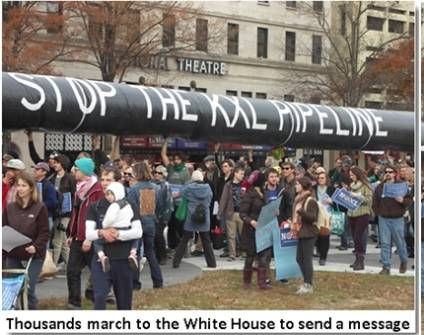(Article changed on November 19, 2012 at 11:38)
By Michael Collins
(Washington, DC 11/18) Bill McKibben, founder of 350.org. had some tough words for the oil giants at the organization's events in the nation's capital. He announced to a packed house at the Warner Theater, "We're going after the fossil fuel industry" for trying to wreck the future. It's that simple. He argued that we have a choice. Either we take on the oil giants and end their rapacious behavior or we find a way to change the laws of physics to accommodate the insanity of ongoing pollution in the face of calamitous outcomes.
Shell, Exxon, BP, and the others in the fossil fuel industry were portrayed as world killers, rogue corporations whose relentless pursuit of profits threatens the lives and culture of every human being on earth.
The 350.org Do the Math Tour started in Seattle on November 7. The nationwide tour visits 21 cities across the country and culminates in Salt Lake City on December 3. Yesterday's presentation at the Warner Theater was followed by demonstration during which participants encircled the White House to remind President Barack Obama to hold fast on suspending work on the Keystone XL oil pipeline.
The math is simple and painful in its implications:
- 2 degrees Celsius - the amount of global warming (ongoing now) that the world can sustain before a massive meltdown starts for both polar caps leading to an exponential rise in sea level and more (some say even two degrees is too high)
- 565 Gigatons - the total amount of carbon dioxide (CO2) we can put into the atmosphere and still retain hope for a livable planet.
- 2,279 Gigatons - the amount of CO2 available in the known reserves of oil companies and other fossil fuel giants; five times the maximum CO2 that can enter the atmosphere in order for human life as we know it to survive.
At an annual burn rate of about 30 billion tons of CO2, the earth has fifteen to sixteen years to find a viable alternative to carbon dioxide producing fossil fuels for cars and everything else. At this point, success means simply mitigating the catastrophes awaiting us.
And those catastrophes are guaranteed to come. McKibben made the case that
To those who might be skeptical, McKibben offered some reminders.
- Hurricane Sandy - "Expect more Sandies and Katrinas. Expect more heat waves. Expect more droughts."
- Drought in the Midwest - A D4 drought engulfed the breadbasket of the United States. Expect more of the same around the globe.
- Arctic summer ice melts - Expect a "sea ice free summer Arctic within 30 years."
It is not too late to mitigate the serious problems brought on by climate change.
McKibben was joined by author Naomi Klein, Bishop Desmond Tutu of South Africa, and others as he outlined a new approach which includes ongoing global organization and action by 350.org (now in over 100 countries). The main action item Sunday was an appeal for divestment of fossil fuel energy stocks by major organizations, colleges, and pension funds. McKibben made this salient point. What would any pension funds to invest in fossil fuel companies that are doing everything they can to make sure pensioners are not around to enjoy their retirement?
Visiting the White House - a Reminder to the President on the Keystone XL Pipeline
When McKibben's speech ended, many in the crowd left the Warner Theater to join a march around the White House. There was a two hundred or so foot long replica of the Keystone XL pipeline carried by participants.
The proposed KXL pipeline will carry asphalt laden crude oil extracted from Alberta's tar sands formations across the U.S. Middle West to refineries in Houston, Texas. After it's refined it will be shipped to the energy hungry China, which has few environmental controls. A more direct route to China through the British Columbia coastline has been blocked by Canada's First Nation's aboriginal population due to their fear of environmental problems. As a result, the U.S. will be turned into a pathway for this risky operation. There will be no oil used here.
In addition to the threat of oil spills, the risk of contamination to one of the nation's most important water supplies (the Ogallala Aquifer), and the arbitrary seizure of private property for pipeline right-of-way, there's one other problem that needs to be addressed. In an article written for the New York Times, James Hanson, our leading climate scientist, made this key point: "Canada's tar sands, deposits of sand saturated with bitumen [asphalt], contain twice the amount of carbon dioxide emitted by global oil use in our entire history."
How would this affect the world?
(Note: You can view every article as one long page if you sign up as an Advocate Member, or higher).






